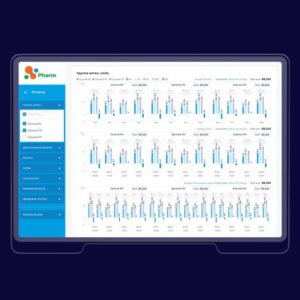- Home
- /
- Services
- /
- Generative AI
- /
- End-to-End ML Pipeline: AI at Speed
End-to-End ML Pipeline:
AI at Speed
End-to-End ML Solutions
Industrial End-to-End ML Pipelines
Manufacturing
- Leverages machine learning algorithms to predict equipment failure before it occurs.
- Reads real-time sensor data and historical maintenance records to identify potential breakdowns.
- Minimizes downtime and reduces maintenance costs with model artifacts and model governance.
Fintech
- Develops advanced ML models to detect fraudulent transactions and suspicious activities.
- Creates sophisticated risk-scoring systems using complex behavioral and transactional patterns.
- Enhances financial security through real-time anomaly detection and model monitoring.
Telecom
- Uses ML algorithms to forecast network load and predict potential infrastructure bottlenecks.
- Optimizes network resources and bandwidth allocation dynamically.
- Improves service quality and customer experience through intelligent network management.
Logistics
- Implements AI-driven route optimization to minimize transportation costs and delivery times.
- Develops predictive inventory management systems to balance stock levels and reduce waste.
- Enables data-driven decision-making for supply chain efficiency and resource allocation.
Retail
- Creates personalized customer experiences through advanced demand forecasting models.
- Develops recommendation systems that adapt to individual customer preferences and behaviors.
- Optimizes pricing strategies and inventory management using predictive analytics.
Healthcare
- Applies machine learning to analyze medical images with high accuracy and speed.
- Develops predictive diagnostic models that assist medical professionals in early disease detection.
- Enhances treatment planning and patient outcomes through intelligent data interpretation.
Tired of ML projects dying before takeoff?
Voltera Success Stories: Generative AI in Action
Check out a few case studies that show why VOLTERA will meet your business needs.
Stock relocation solution
The client was faced with the challenge of creating an optimal assortment list for more than 2,000 drugstores located in 30 different regions. They turned to us for a solution. We used a mathematical model and AI algorithms that considered location, housing density and proximity to key locations to determine an optimal assortment list for each store. By integrating with POS terminals, we were able to improve sales and help the client to streamline its product offerings.

Client Identification
The client wanted to provide the highest quality service to its customers. To achieve this, they needed to find the best way to collect information about customer preferences and build an optimal tracking system for customer behavior. To solve this challenge, we built a recommendation and customer behavior tracking system using advanced analytics, Face Recognition, Computer Vision, and AI technologies. This system helped the club staff to build customer loyalty and create a top-notch experience for their customers.

Performance Measurement
The Retail company struggled with controlling sales and monitoring employees’ performance. We implemented a software solution that tracks sales, customer service, and employee performance in real-time. The system also provides recommendations for improvements, helping the company increase profits and improve customer service.

Supply chain dashboard
The client needed to optimize the work of employees by building a data source integration and reporting system to use at different management levels. Ultimately, we developed a system that unifies relevant data from all sources and stores them in a structured form, which saves more than 900 hours of manual work monthly.

Michelle Nguyen
Senior Supply Chain Transformation Manager Unilever, World’s Largest Consumer Goods Company
View case study →

End-to-End ML Pipelines Technologies
Lama 2
Zilliz
Weaviate
Stable Difusion
Qdrant
Pix2Pix
Pinecone
Pgvctor
OpenAI
Momento
Mixtral
Llava
Hugging Face
Faiss
Chroma
ChatGPT
Activeloop
YOLO
SageMaker
Pillow
NLTK
Keras
SciPy
Redis








